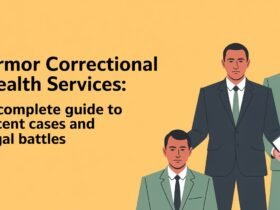Introduction
The Smoothstack lawsuit has become one of the most closely watched employment law cases in the United States, drawing national attention to the use of Training Repayment Agreement Provisions (TRAPs) in the tech staffing industry, a topic of considerable controversy. Smoothstack, a Virginia-based IT staffing and training company, has been accused of locking workers into unfair contracts, withholding lawful wages, and creating financial penalties so severe that leaving the company becomes nearly impossible without incurring thousands of dollars in debt. As the legal battle unfolds across multiple fronts—including a worker-led class action and a federal enforcement action from the U.S. Department of Labor—its outcome could reshape labor practices in tech staffing nationwide.
The Foundational Class Action: O’Brien v. Smoothstack
The central Smoothstack lawsuit commenced on April 13, 2023, when former employee Justin O’Brien filed a class-action lawsuit in the United States District Court for the Eastern District of Virginia. The complaint alleged that Smoothstack’s training program came with strings attached: participants were required to sign contracts committing them to work for the company for a fixed period, typically two years, or pay back training costs of up to $20,000 to $30,000. These repayment clauses—TRAPs—were allegedly used as a tool to control employee mobility, effectively functioning as a form of modern debt bondage.
O’Brien’s suit also claims that Smoothstack failed to comply with fundamental wage laws. The plaintiffs argue that the company failed to pay minimum wage or overtime during mandatory training periods and when employees were “benched” between client assignments. In addition, the lawsuit alleges that Smoothstack requires employees to work unpaid overtime hours once placed with clients, a direct violation of the Fair Labor Standards Act (FLSA) and Virginia state labor laws.
The legal team for O’Brien asserts that these practices were not isolated incidents but systemic policies, affecting hundreds of workers who entered Smoothstack’s program under similar terms. If successful, this class action could void the repayment agreements entirely and lead to substantial back pay awards.
Department of Labor’s Enforcement Action
The Smoothstack lawsuit gained even greater visibility when the U.S. Department of Labor (DOL) filed its enforcement action on July 10, 2024. The DOL’s complaint mirrored many of the allegations in O’Brien’s suit but framed them in the context of federal labor rights violations. According to the DOL, Smoothstack and its co-founder, Boris Kuiper, utilized repayment agreements as a coercive tool to deter workers from leaving, effectively trapping them in jobs under the threat of massive debt.
The DOL also highlighted additional issues, such as the use of confidentiality clauses designed to deter employees from speaking out or participating in legal proceedings. Federal investigators concluded that these agreements were not only financially punitive but also interfered with employees’ legal rights under the FLSA.
In announcing the lawsuit, the DOL compared Smoothstack’s practices to “modern-day indentured servitude,” underscoring the seriousness with which the government views the matter. This enforcement action is significant because it represents a rare instance where the DOL has directly targeted TRAPs, potentially setting a precedent for broader crackdowns on similar agreements in other industries.
Court Rulings and Procedural Updates
The legal process in the Smoothstack lawsuit has been lengthy and complex, with several significant developments. On March 28, 2024, a federal judge ruled on Smoothstack’s motion to dismiss the original complaint. While some claims were dismissed, the court allowed key allegations regarding unpaid wages, overtime violations, and unconscionability under the TRAP to proceed. This mixed ruling kept the core of the plaintiffs’ case alive and paved the way for class members to be notified.
The litigation advanced further in July 2025, when the court considered the Second Amended Complaint. On July 11, 2025, the judge granted the motion to dismiss in part but denied it in part, allowing major claims related to minimum wage, overtime, retaliation, and regular-rate violations to move forward. Claims that were dismissed were done so without prejudice, meaning the plaintiffs have the option to refile with additional supporting evidence.
These rulings have set the stage for the discovery phase, where both sides will exchange evidence, depose witnesses, and prepare for potential trial. In parallel, the DOL’s separate enforcement case is also moving forward, increasing the legal pressure on Smoothstack.
Current Status and Next Steps
As of August 2025, the Smoothstack lawsuit remains active in federal court. The following procedural step is to schedule an order that outlines timelines for discovery, expert reports, and pre-trial motions. Both the class action and the DOL’s case are expected to run concurrently, which may lead to overlapping evidence and witness testimony.
Given the complexity and potential financial exposure, some legal experts believe the case could settle before trial. A settlement could involve:
- Voiding the TRAP agreements
- Paying back wages
- Compensating workers for emotional distress and other damages
However, if no settlement is reached, the case could proceed to a full jury trial, which would likely attract significant media coverage due to its potential implications for the broader staffing and tech training industries.
Why TRAPs Are Controversial
The Smoothstack lawsuit has sparked a larger conversation about the ethics and legality of TRAPs. While companies argue that repayment agreements protect their investment in employee training, critics contend that these contracts often far exceed the actual cost of training and are structured primarily to deter workers from leaving their employment. In the tech staffing model, where workers may be placed on “benches” without pay between assignments, TRAPs can leave employees in a vulnerable position: unable to find new work without incurring crippling debt.
Labor advocates argue that such arrangements undermine fair competition and worker mobility, particularly for early-career professionals who may lack the financial resources to challenge them. The Smoothstack case is seen as a potential turning point in the fight against these practices.
Wider Industry Significance
The Smoothstack lawsuit is not just about one company—it’s about an entire business model. The “hire-train-deploy” approach, used by several staffing firms, is now under increased scrutiny from both regulators and the courts. If the plaintiffs succeed, other companies using similar agreements may face legal challenges, regulatory investigations, or be forced to reform their contracts.
For employers, the case serves as a warning that aggressive contractual restrictions can backfire, leading to costly litigation and reputational damage. For workers, it emphasizes the importance of carefully reading and understanding employment contracts before signing, particularly when repayment clauses are involved.
Potential Outcomes and Implications
Several potential scenarios could emerge from the Smoothstack lawsuit:
- Settlement: Smoothstack could agree to a financial settlement, including repayment of wages, cancellation of TRAP agreements, and possibly policy changes.
- Plaintiff Victory at Trial: If the case goes to trial and the plaintiffs win, it could set a binding precedent for how TRAPs are treated under federal and state labor laws.
- Defendant Victory: If Smoothstack prevails, it may embolden other companies to continue using similar contracts, although the public scrutiny could still pressure them to change.
- Regulatory Impact: Regardless of the court outcome, the DOL’s involvement signals a shift in enforcement priorities, which could influence future policymaking.
Conclusion
The Smoothstack lawsuit is more than a legal dispute—it is a defining moment in the ongoing battle over workers’ rights in the staffing and training sector. With a class action and a federal enforcement action both underway, Smoothstack faces mounting legal and public relations challenges. The case’s outcome could have sweeping consequences, not only for the company’s current and former employees but for the broader debate over the legality and fairness of training repayment agreements.
As the case moves into the next phase in 2025, it will serve as a test of how far courts and regulators are willing to go in protecting workers from what critics describe as coercive and exploitative contractual practices. For employees, employers, and policymakers alike, the Smoothstack case is one to watch closely—it could well be the catalyst for significant change in the tech staffing industry.
Also read more interesting topics at mgtimes.co.uk.






Leave a Reply